Coalition Work
WHAT WE DO
REFC supports state-level coalitions bringing together diverse allies to drive equity agendas and champion bold policy to fully and fairly fund schools.
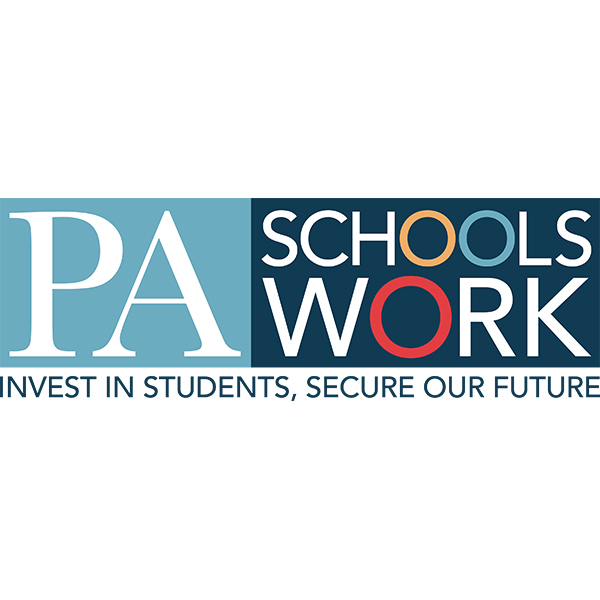
Pennsylvania
Pennsylvania Commonwealth on the Brink of Education Funding Overhaul

Pennsylvania Commonwealth on the Brink of Education Funding Overhaul
With all eyes on the state’s education lawsuit, PA Schools Work coalition is gaining momentum in support of adequate and equitable school funding.
Like many states in the US, the majority of Pennsylvania’s public school funding comes from local property taxes. Recent Census data has indicated that Pennsylvania ranks 45th in terms of the share of school funding that comes from the state. This outdated model means a child’s educational opportunities are almost entirely determined by how wealthy or poor their neighborhood is. Wealthier, and often whiter, school districts are left with surplus funds for essential programs, such as after school activities or tutoring, while poorer communities often struggle just to replace classroom desks or maintain teaching staff. In fact, the state has one of the widest spending gaps in the country, with wealthier school districts spending an average of $114,000 more per classroom than the poorest districts. Simply put, Pennsylvania students are not given an equal opportunity to succeed, which disproportionately impacts students living in both rural and urban areas across the commonwealth.
Enough is enough. In 2014, students, parents, and educators reached their limit, and filed a lawsuit that contends Pennsylvania officials have ignored their obligation under the state constitution to adequately fund schools. The trial is set to begin in October 2021. At the same time, Governor Wolf signed a state budget with the largest increase in education funding in the commonwealth’s history. Pennsylvania public schools are at a critical turning point. At this nexus moment, PA Schools Work, a coalition of educators, parents, and community leaders, is paying close attention and keeping the public informed and engaged on the state’s actions.
PA Schools Work sprouted from the 2016 campaign that successfully fought for changes to the statewide funding formula, which allocated a greater portion of education funding based on student and community need. While this was a significant victory, these advocates realized there was much more to be done to achieve education equity in Pennsylvania. PA Schools Work is present in urban, suburban, and rural schools across the commonwealth and works in partnership with organizations including Children First, Urban League of Philadelphia, and Education Voters of PA. Informed by insights from school board members, superintendents, and teachers, PA Schools Work is ensuring that legislators feel the pressure to provide every school with the resources to ensure their students have the opportunity to succeed, regardless of where they live.
Coalitions are the changemakers. A key priority of PA Schools Work is informing Pennsylvanians on how education funding works and the dire need to correct the status quo. The coalition leads monthly education funding webinars to update concerned community members on pertinent information, including state budget changes, school counselor shortages, and the state’s pending lawsuit. The coalition has also hosted free learning opportunities for the public, such as their first ever statewide Communities United for Our Student’s Future Summit in 2018. This brought together hundreds of local school and community leaders to organize and advocate for increased public school funding. More recently, PA Schools Work hosted a virtual Parent’s Summit in the spring of 2021, bringing together community members and local legislators leading the fight for equitable school funding. Individuals left the summit with actionable strategies for lobbying local elected officials to vote in favor of increased school funding.
Fighting for an equitable future. PA Schools Work is making sure both legislators and the general public understand that providing equal access to education not only benefits students, but will create a stronger, more robust Pennsylvania workforce and economy. In May 2021, the education coalition recruited superintendents, administrators, and education policy experts from districts across the commonwealth to host simultaneous press conferences urging local legislators to increase state funding for public education. From Pittsburgh to Lancaster to Scranton, individuals from over 26 different school districts attended these press conferences. This growing group of education advocates is well-versed in the nuanced policy and advocacy required to be successful in Pennsylvania’s legislature. Through innovative strategies to reach red and blue districts, PA Schools Work is putting immense pressure on local lawmakers to unite them in a common goal, to increase education funding, and to equitably allocate funds to the students who need it most.
PA Schools Work believes in Pennsylvania schools — that’s their mantra; PA Schools Work… when they’re equitably and adequately funded. This group of passionate public education advocates is confident that, if Pennsylvania schools receive enough funding through a truly fair funding formula, the opportunity gap between the richest and poorest districts in the state will shrink. With additional support, PA Schools Work will work to further expand public support for education equity through increased community outreach, paid media campaigns, an expanded online presence, and frequent events and learning summits with local legislators.
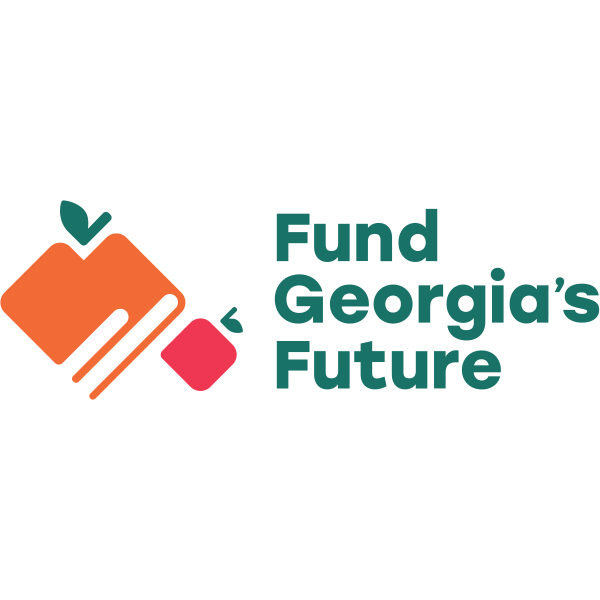
Georgia
Georgia’s Fight to Disrupt the Status Quo

Georgia’s Fight to Disrupt the Status Quo
Following devastating cuts to public education amid the COVID-19 pandemic, Fund Georgia’s Future is leveraging community engagement to bolster support for increased investment in public education.
COVID-19 has disrupted every element of daily life for millions of Georgians. For Georgia’s students and educators, the impact has been especially severe. Against the backdrop of decades of underinvestment in the state’s public school system, Georgia cut nearly $400 million from its education budget in response to the pandemic, while simultaneously voting to expand existing private school voucher programs. In the 2021-2022 school year, the state will have failed to provide the minimum amount of funding required by law for the 18th time in 20 years, forcing local districts to make up the loss, which disproportionately hurts low-income students and students of color.
Georgia’s students deserve better and communities are stepping up to demand change. Fund Georgia’s Future, a coalition of educators, parents, and advocates, is leading the fight, fueled by the recognition that a brighter tomorrow begins with building a more just and equitable public education system today. To achieve a fair and fully funded system, the state must meaningfully engage with the public, especially students and families in the education system; dismantle historical systems of marginalization; halt the use of public funds for private education; and fund schools based on student needs.
Georgia is underinvesting in public education. Georgia is one of only eight states where schools are not provided additional money to educate students living in poverty.
Historically, Georgia lawmakers on both sides of the aisle have felt little pressure to do more than the bare minimum on education and seem content to maintain the underfunded status quo. Class sizes are far too big and teacher furloughs far too frequent. Schools are chronically understaffed, lacking sufficient counselors, instructional aides, and administrative and custodial support. Art and music programs are constantly on the chopping block and the highest-need districts are always the hardest hit.
Despite deep-seated frustration with the system, few Georgians know whom to blame. While it remains the federal and state governments’ responsibility to fund public education, the money is controlled at the local level, so it is imperative that communities put pressure on their local districts to ensure that funding is allocated fairly and responsibly.
Coalitions like Fund Georgia’s Future will disrupt the status quo. Fund Georgia’s Future is quickly gathering momentum and cultivating a strong community of stakeholders ready and eager for change. Coalition-sponsored training sessions have drawn large audiences of parents and community members seeking to understand the sources of school funding and discuss strategic responses to ongoing attempts to cement white supremacy in policy and curriculum. The coalition has developed “Local Level Advocacy Guides” to empower folks to put pressure on their local lawmakers and demand that federal aid be spent on schools and programs that need it most.
Meanwhile, coalition leaders are tracking legislative activity and considering a range of future policy recommendations on issues from school vouchers and equitable funding formulas to disciplinary policy and trans student rights. However, the coalition’s success will depend on its ability to mobilize community members and channel decades of public frustration into effective activism. Moving forward, Fund Georgia’s Future will provide students, educators, and citizens with opportunities for direct action around the state, and will focus on uplifting Black and Brown voices that have long gone unheard.
Fund Georgia’s Future has also begun awarding grants to advocacy organizations throughout the state, prioritizing organizations from underrepresented communities including BIPOC-led groups and those in rural Georgia. Friends of Refugees received a grant for their Refugee Family Literacy Program in DeKalb County, which aims to ease communications with schools and teachers for English language learning families. Groups like the Georgia Coalition for the People’s Agenda and Coalicion De Lideras Latinos Inc received funds to support various community outreach efforts.
Join Fund Georgia’s Future. The coalition is building broad support for a more equitable funding formula that would provide much needed resources for students experiencing poverty, students with disabilities, and English language learners.
With its ambitious agenda, the coalition is working to expand its reach and network, which currently includes the Georgia Budget and Policy Institute, Southern Education Foundation, Intercultural Development Research Association, Georgia Appleseed Center for Law and Justice, Deep Center, Southern Poverty Law Center, and the Georgia Coalition for the People’s Agenda. Fund Georgia’s Future has distributed a survey designed to gather local data on educational needs and identify partner organizations to thoughtfully grow its membership across the state.
The movement for equitable education in Georgia is well underway. Educators, students, parents and community members can get informed and involved today by visiting Fund Georgia’s Future and signing up for their newsletter.

North Carolina
Creating An Education System for Every Child
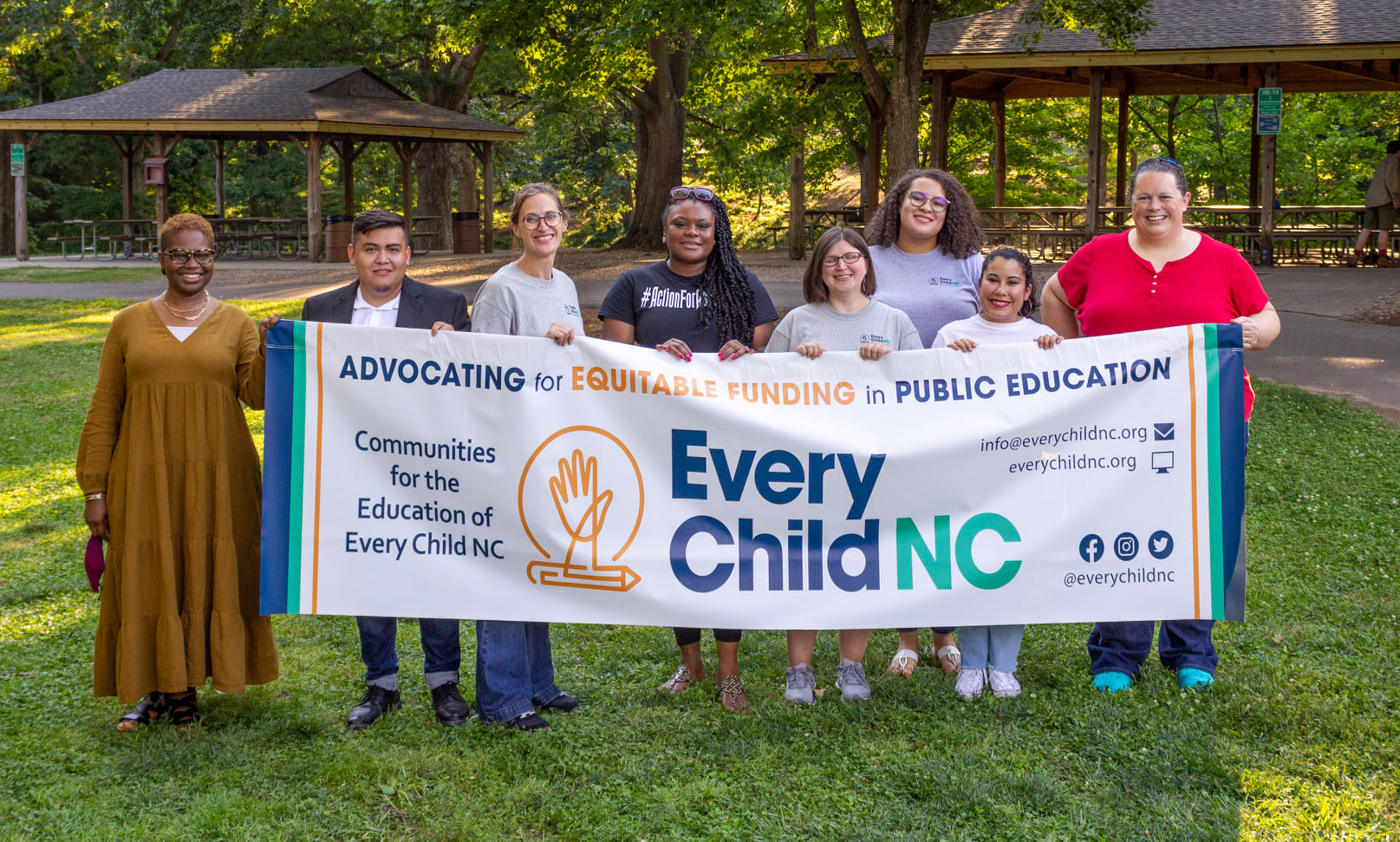
Creating An Education System for Every Child
Frustrated by decades of underfunded public education, Every Child NC is galvanizing support for a fully-funded education system that provides every child with the opportunity to succeed.
In 2002, the North Carolina Supreme Court found the state had failed to meet its obligation to provide all students with a sound, basic education and called for immediate action to improve North Carolina schools. Nearly two decades after Leandro v. State, the same deficiencies in public education persist despite having a roadmap towards compliance in the Leandro Plan. In fact, state lawmakers have defiantly refused to fund this plan despite the state having billions in unappropriated revenue. COVID-19 only further exacerbated disparities in educational opportunities across the state.
Time and again, lawmakers in Raleigh blame students for the state’s poorly performing schools rather than taking responsibility for their role in upholding the systemic inequity that hinders so many students’ success. The state’s property-tax based education funding structure drives much of the resource inequity, yet lawmakers have been unwilling to use the power of the legislature to make up for the resultant gaps in opportunity. Instead, the state has deliberately underfunded public education, all while funnelling public money into private voucher programs.
Frustrated by the state’s inaction, communities have stepped up to demand more for our children – both for early learners and K-12 students. Every Child North Carolina, a community-led, statewide coalition of students, parents and teachers, is defending the constitutional right of all children to a sound, basic education, regardless of students’ race, ethnicity, economic background, regional location, disability, gender identity and sexual orientation, immigration status, or first-language.
Every Child NC is mobilizing for change. This coalition of education advocates is bringing the fight to the state lawmaker’s door in Raleigh, from organizing demonstrations at the General Assembly to encouraging community members to contact their state representatives and demand adequate and equitable education funding for all North Carolina students. To uplift their message and intensify public pressure, the coalition is empowering advocates to submit articles and OpEds that demonstrate the system’s profound deficiencies and in 2020 collaborated with the OpEd Project to host a writing workshop for partners.
Through town halls, community forums, and panel discussions, the coalition is raising public consciousness about the need for urgent policy action, full funding for the Leandro Plan, and greater investment in the state’s public education system. Along with its legislative allies, Every Child NC is pushing to influence the state’s 2021-2023 biennium budget, which should be finalized this fall. Over the summer, the coalition held three town halls which included panels with advocates, student voices, and educators. Every Child also hosted a virtual event on the attack on truth in teaching to discuss the recent and dangerous efforts to silence Black and Brown teachers in the state.
Every Child NC played a significant role in the 2020 elections, developing helpful voter education Advocacy Toolkits that explained who is responsible for education policy in the state government and identified candidates in favor of increased education funding. The coalition also launched a Partner Support Fund that awards small grants to organizations furthering the coalition’s mission, including coalition partners like ISLA and NAACP North Carolina who worked on voter outreach and raised awareness around public education and racial equity during the 2020 election cycle.
Every Child NC is leading the charge. Because of hundreds of phone calls from advocates, extensive online pressure, and the #LeadwithLeandro video series, Governor Roy Cooper included funding for the Leandro Plan –– which would correct the state’s inaction following the Leandro ruling –– in his most recent budget. To help educate advocates on the issue, the coalition developed the Leandro Budget Impact tool that calculates the impact The Leandro Plan would have on each district’s public education funding. This allows communities to better understand where funds are needed most and strategically target their advocacy efforts.
Join Every Child NC. Every Child NC envisions a future where communities, families, voters, and elected officials agree that every child deserves the public education they are constitutionally owed. As they build toward that future, the coalition will continue to build partnerships throughout North Carolina, raise awareness among the public, and mobilize direct action across the state. Over the past year, Every Child NC has grown its partner membership, welcoming three organizational members to the Coordinating Committee (leadership team), as well as multiple organizational partners and individual advocates. Moving forward, additional funding would allow Every Child NC to expand its reach further by hiring full-time staff and supporting more local community organizing.
Educators, students, parents and community members can get informed and involved today by visiting Every Child NC and following Every Child NC on Facebook, Twitter and Instagram.
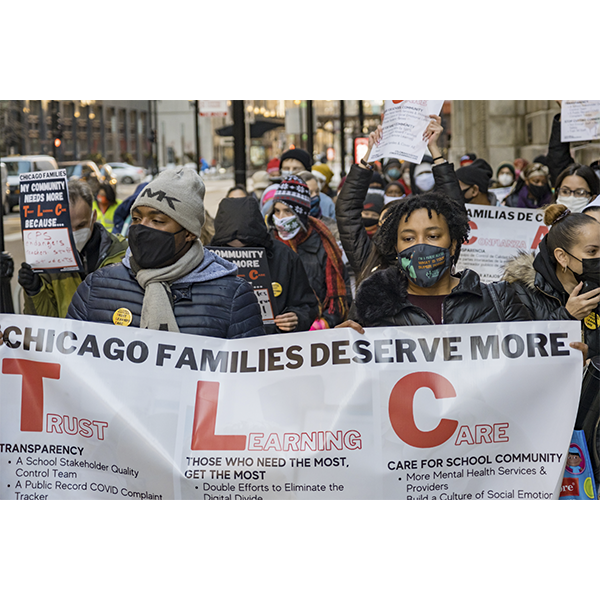
Illinois
How An Illinois Coalition is Empowering Parents to Transform a Legacy of Public Education Mismanagement
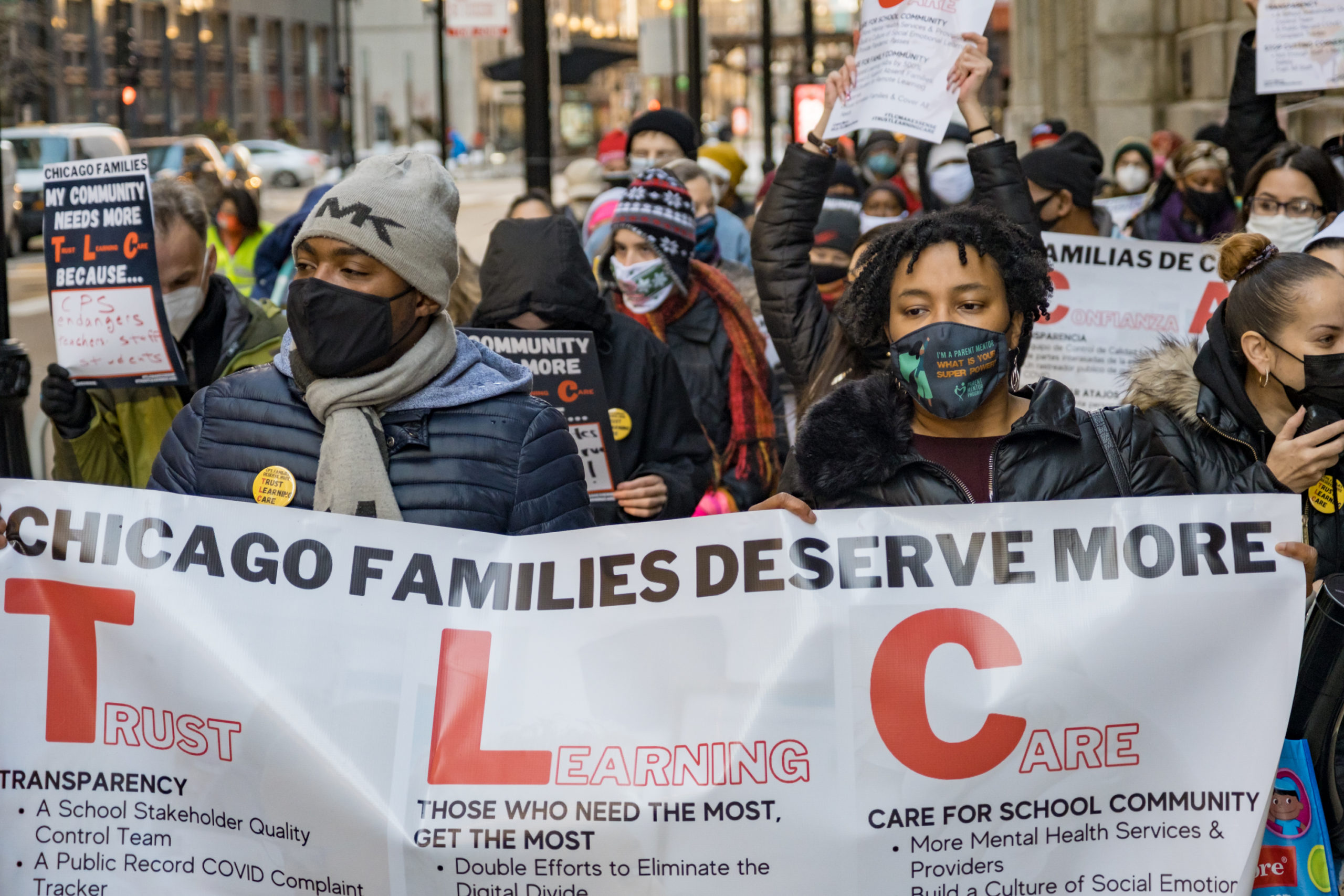
How An Illinois Coalition is Empowering Parents to Transform a Legacy of Public Education Mismanagement
PEER IL works across the state at the grassroots level to engage parents to drive progress together.
As the state sits on a mountain of debt, historical financial mismanagement in Illinois is perpetuating systems of oppression and slowly chipping away at the futures children deserve. The state replaced what was described as “the least equitable funding formula in the country” in 2017 with the new Evidence-Based Funding for Student Success Act, or EBF. The plan distributes state dollars as they become available to school districts that need them most. However, over 67% of schools in Chicago lack adequate funding today because legislators continue to fund education only when politically convenient. At their current pace of annual funding increases, Illinois lawmakers will not be able to fully fund the EBF until 2059.
Illinois has long-evaded responsibility for adequately funding schools and left it up to the municipalities to fill the gaps, often resulting in the richest municipalities being able to provide significantly more resources to schools. With wealthier municipalities able to fully fund their schools, there’s a lack of urgency at the state level to address the root issues, exacerbating the opportunity gap and inequality in school funding that has crippled under-resourced schools for generations.
Established before the COVID-19 pandemic, PEER IL is a coalition of eight partners and organizations working across the state to fight for education equity. The coalition is convened by parent-led advocacy organization Raise Your Hand IL, nonprofit civil rights law firm Chicago Lawyers Committee for Civil Rights, statewide grassroots education equity organization IL Families for Public Schools, and community-based organization the Brighton Park Neighborhood Council. In an effort to advocate that public funds shouldn’t be spent on private education, one of the coalition’s first goals was to increase transparency around how education funding is actually being distributed. Earlier this year, the Lawyers’ Committee for Civil Rights led the coalition to file a brief in the Illinois Supreme Court urging the Court to allow a lawsuit challenging inequitable school funding to move to trial.
PEER IL is placing significant focus on expanding partner outreach and growing education equity organizing efforts across the state. Key to this strategy is engaging, informing, and empowering parents to become public education advocates for all children. The coalition understands students’ urgent need for advocates statewide, from rural areas to the suburbs to cities. As the lead convenor, Raise Your Hand is advocating for students with special needs, connecting parents to additional resources, including Student Specific Corrective Action and Universal Enrichment Remedy that provide much needed support for underrepresented students.
A major opportunity to right wrongs. As soon as EBF was implemented in 2017, policymakers assumed their work to adequately resource schools was finished. But it’s quite the contrary—Raise Your Hand works with fellow state coalitions in support of legislation that increases school funding. This new state-wide push with legislators is revitalizing the political will to make changes throughout the entire state of Illinois and, on June 1st, state legislators approved a $42 billion state budget that includes $350 million in additional education funding. The state now has a decision to make—legislators can either commit to the long-term investment in the future of children or revert to the unacceptable status quo.
Connecting and empowering parents across the state. On January 31, Chicago dismissed the idea that more must be done to improve virtual learning, stating “we have done everything that we can do to make remote learning work as good as possible.” But for the hundreds of thousands of students whose education quality steadily declined, this just wasn’t true. In reality, current plans for a return to in-person learning fell short of what families needed to feel safe and supported. Tired of being left out of the conversation, Chicago Public School students, parents and teachers came together to create the Trust Learning Care (TLC) campaign, which lifts up the demands for basic needs, like more mental health services and remote learning expenses, in order to recover during the pandemic. TLC’s traction has put pressure on Chicago Public School leadership, resulting in overall engagement and conversations on how the new federal funding can be used to support these basic needs.
A pipeline to community leadership. Raise Your Hand also invests in Local School Councils to support work being done at the ground level in Chicago Public Schools. Formed 30 years ago, Local School Councils are elected bodies of parents who focus on school improvement, budgets and principal evaluation. This pipeline of community leadership is one of the most hyperlocal democratic levers in the entire country, representing the diverse racial and economic demographics of the city and empowering parents to participate in local governance.
Long-term success is dependent on sustained funding from progressive tax reform. The years of financial mismanagement in Illinois without any attempts at genuine transparency reform have created public distrust in government and made it incredibly difficult to get a referendum on a ballot. Following 8 years of constant organizing and coordination, advocates were able to get the ‘Fair Funding’ amendment to the state’s constitution on the ballot in 2020. The amendment would have ensured the wealthiest 3% of Illinoisans would pay a higher income tax, while the rest of the state would see a cut, which would have significantly increased funding for public education. However, voters, wary of the historical mismanagement of tax revenue, saw no credibility in the progressive tax plan and ultimately rejected the amendment. Raise Your Hand is determined to build momentum from the last legislative session by pointing Illinois lawmakers to other opportunities for increased public education funding like closing corporate tax loopholes and reversing certain subsidies. Raise Your Hand continues to sustain grassroots efforts to increase funding efforts by giving a voice to students, parents and teachers across every corner of the state.
If you’d like to join PEER IL’s fight for education equity in Illinois, participate in the community survey to emphasize the need for additional funding for special education programs, take a look at the resources available, or get involved with other community leaders.
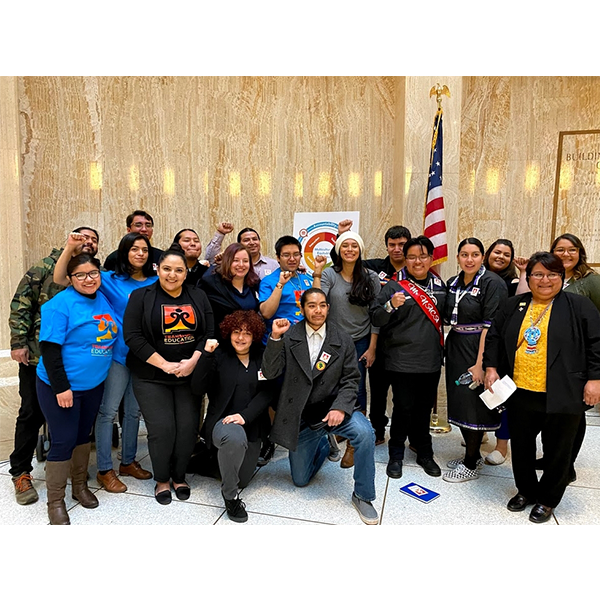
New Mexico
Transforming Public Education in New Mexico
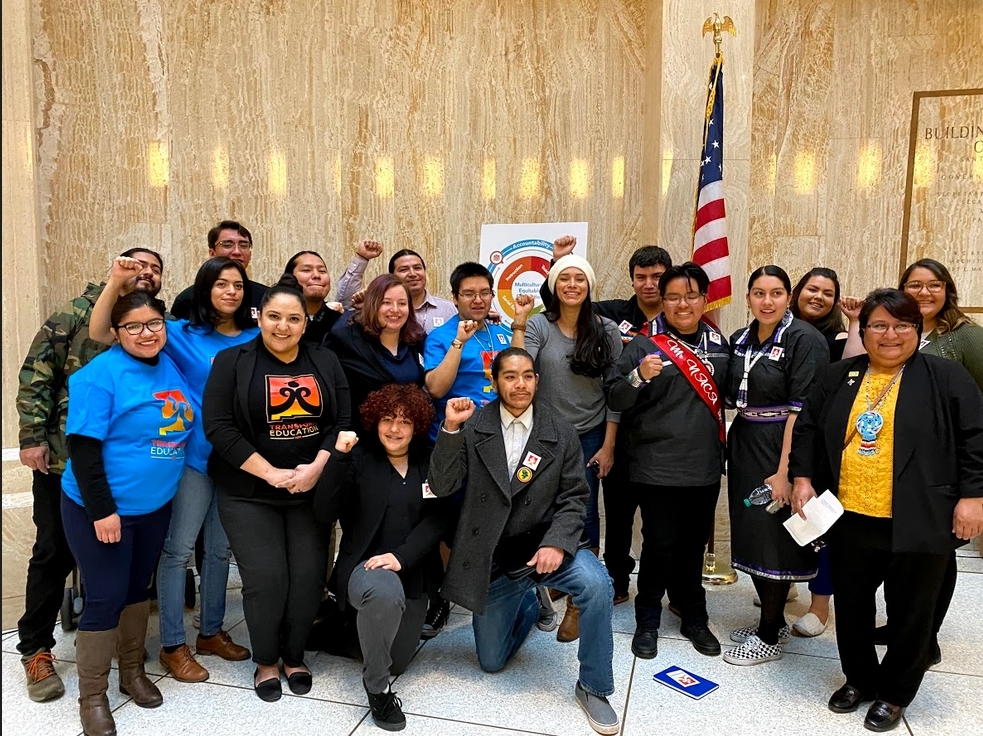
Transforming Public Education in New Mexico
Capitalizing on a recent legal challenge, Transform Education New Mexico is working to build a multilingual, multicultural education framework grounded in student equity.
In 2014, families and school district officials, frustrated by decades of inequitable and underfunded public education, sued the State of New Mexico for violating students’ rights. The education system has long failed to honor New Mexico’s rich cultures and provide the support and curriculum that best serves its diverse students. This lack of funding perpetuates sizable racial and economic opportunity gaps that often result in the lowest graduation rate in the nation.
Yazzie/Martinez v. State of New Mexico, however, created opportunity and leverage for New Mexico’s families, Tribes, and education advocates to push for much needed reforms. In the landmark 2018 decision, New Mexico’s First Judicial District Court ruled that the state was violating New Mexico students’ constitutional right to a sufficient education, and that the state must invest in the programs and services necessary to close opportunity gaps and fix deep inequities for low-income, Native American, English Language learner students, and students with disabilities.
While the legal battle continues, New Mexico has seen a groundswell of momentum around education equity and reform, paving the way for Transform Education New Mexico (TENM). A coalition of students, teachers, the Yazzie legal team, education experts, and Tribal and community leaders, TENM is working to advance a new vision for public education in New Mexico that honors language, diversity, and equity.
TENM is advocating for transformational change. After speaking with hundreds of diverse community leaders, educators, lawyers, and elected officials, the coalition released its “Platform for Transformation”—a blueprint for an education system that works for all students. TENM is keeping pressure on the state to implement these long-overdue reforms and is holding the state accountable to comply with the court’s order.
In the near term, TENM is pushing New Mexico to commit to transforming the state’s education system, including significant investments in a multicultural education, programs like universal quality Pre-K, teacher recruitment and retention, and access to health and social services. Long term, TENM is working to see an overhaul of the current system in favor of one equipped to fully address the deep-rooted educational inequities and successfully prepare students for college and careers.
Change is coming. The momentum built by TENM, the leverage from Yazzie/Martinez, and the work of key partners such as Tribal Education Alliance (TEA) resulted in several legislative victories in 2021. The legislature allocated an additional $217 million in public education funding and another $15.7 million for Indigenous education initiatives. Additionally, teachers saw a four percent pay increase, Pre-K received additional funding, and the school funding formula was adjusted to award more money to high-need schools. However, these are only incremental steps; more is needed to meet the needs of New Mexico’s students.
When instruction went online due to COVID-19, 55% of Native American students could not access their courses, exposing the state’s gaping digital divide. Students like Evan Allen had to drive five miles for a strong enough internet connection, only then to attend his classes from the car. TENM’s legal partners and community leaders successfully pressured the state to address this monumental barrier to equitable education. Since April 2021, New Mexico has been ordered by the court to guarantee access to electronic devices and quality internet to students in need.
Meanwhile, TENM continues to build a strong community of stakeholders through traditional and social media, online forums, community meetings, and youth organizing. By sharing stories like Evan’s, TENM is raising public consciousness about the need for broad reform and greater investment in the state’s public education system.
TENM is also partnering closely with TEA, a coalition of Tribal leaders, community members, and Indigenous education experts, to advocate on behalf of New Mexico’s Native American students. Together, they are educating the legislature and the broader public about New Mexico’s Native and Indigenous history, and the challenges their community still faces today. Tribes and allies are fighting for full funding, and the implementation of programs and services to meet the educational needs of Native students as described in the “Tribal Remedy Framework” — a comprehensive plan based on tribal education sovereignty.
Join Transform New Mexico. TENM and its partners envision a future for New Mexico’s public schools that centers on students, values educators, and is based on a multicultural and multilingual foundation. This transformation is already underway. As the coalition prepares for the next legislative session, they will continue to expand their reach and grow their capacity. Moving forward, additional funding would allow TENM to produce compelling video and narrative content that educates and moves the public; hire staff for coalition management; and research equitable, culturally and linguistically responsive education that will form the basis of future legislative efforts.
Educators, students, parents, and community members can get informed and involved today by visiting Transform Education New Mexico and signing up for their newsletter. To stay up to date, follow TENM on Facebook, Twitter and Instagram. Find more information on the Tribal Remedy Framework here.
If you’re ready to transform education in New Mexico, contact your legislator and Governor Michelle Lujan Grisham to express your support for an equitable, multilingual, and multicultural education framework.
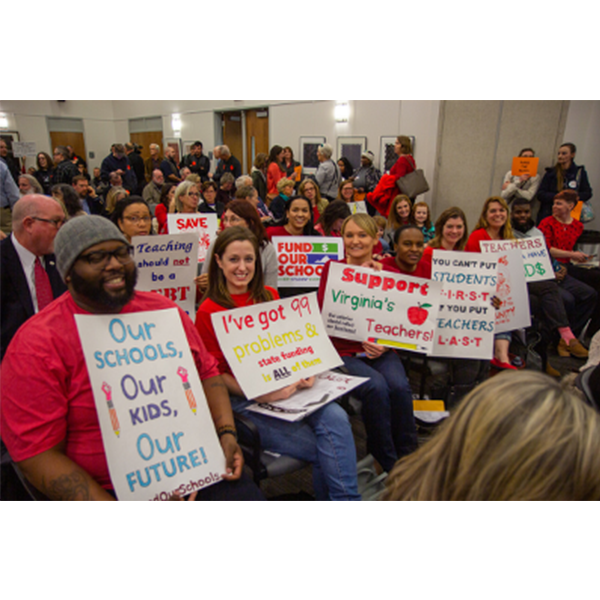
Virginia
A Virginia Coalition Steps Up to Reverse Generations of Underfunding in Public Education
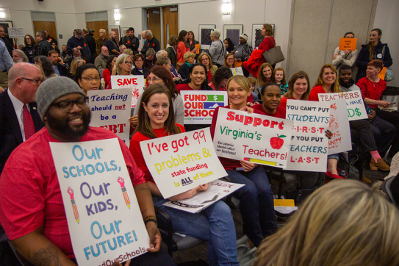
A Virginia Coalition Steps Up to Reverse Generations of Underfunding in Public Education
Additional funding can make a meaningful difference in the lives of students hit hardest by the pandemic.
Virginia’s public schools have been severely underfunded for decades. Rather than proposing lasting solutions, lawmakers have implemented austerity measures that have starved public school budgets across the state. In Virginia, public schools continue to be under-resourced, and students in every zip code suffer the consequences of deteriorating and understaffed buildings and an overall lack of access to adequate technology and resources. Even school divisions that can supplement state investments oftentimes lack the resources to provide sufficient support to its students.
Uniting isolated organizations. Historically, Virginia’s education advocacy organizations engaged in efforts to remedy this underinvestment. Fund Our Schools, a statewide coalition, was launched in 2019 to bring together organizations focused on school funding and education equity under one tent, and to create a cohesive, visible coalition advocating in unison for school funding. To date, the coalition comprises 19 groups throughout the state and streamlines priorities to increase the efficacy of their advocacy. Fund Our Schools began by hosting webinars and town halls in an effort to educate the public about the realities of P-12 funding. Knowing that legislative reforms were necessary, the coalition coordinated meetings with lawmakers to identify where additional funding for schools was most needed, issued memos to state and legislative leadership, and built relationships with leaders in the General Assembly to champion bold legislation that would fully and fairly fund Virginia’s public schools. The coalition’s efforts yielded a successful 2019 legislative session in which lawmakers increased the ratio of support staff to students in schools and indicated bipartisan support for other coalition priorities.
Bridging the rural and urban divide. Public schools across the state—both rural and urban—experience similar challenges when it comes to resources and funding allocation. However, while there was widespread coverage of the challenges facing urban school divisions, there was less coverage of their rural counterparts in Virginia. The coalition recognized the need to address this divide and worked with active urban and rural organizations, as well as supportive legislators, to build a narrative connecting these two state demographics. The coalition supported the authoring of several op-eds that painted a picture of the similar challenges both urban and rural schools face.
While the coalition had planned to begin summer in-person volunteer work to mobilize community members, including canvassing and listening sessions, these efforts were put on pause when the COVID-19 pandemic hit. Prior legislative successes were rolled back and new laws were passed with contingency clauses in place, as legislators and state leaders claimed that the state did not have enough funding to address the decades-long underinvestment in its schools. The pandemic highlighted inadequate levels of school funding and infrastructure, as well as the state’s failure to prioritize students at this incredible time of need. At a time when families lacked access to broadband and students struggled to keep up with online classes, the state pared back its support for education, opting to reserve rainy day funds rather than invest them into schools that needed them most.
Seizing an opportunity for adequate investments. One-time federal funding was made available to Virginia through the American Rescue Plan (ARP), providing a significant opportunity to invest back into historically underfunded students and communities hit hardest by the pandemic. A lifeline for schools, Fund Our Schools began to pivot their focus and strategy to ensure that a large portion of the federal ARP funds went to public education. They prioritized painting a picture of the urgent needs of students lacking adequate resources, such as broadband access, and provided guidance to lawmakers on the most impactful way to reinvest in schools across the state. On the frontlines of this issue, the coalition created informational videos describing opportunities for investing the influx of federal stimulus dollars into local school divisions. Coalition members focused on circulating these videos and a variety of additional resources to community members and local advocates. Additionally, Fund Our Schools prepared informative legislative memos for influential lawmakers who could shape public education budgets and determine funding allocations. The coalition has taken the urgency of this issue beyond the legislature to the public, facilitating Facebook Live events with lawmakers to speak to the opportunities for ARP funding in local school divisions’ budgets.
Prioritizing a long-term solution. Translating legislative jargon for families and working with policymakers to help them understand the need to properly fund public schools have been critical to the successful implementation of ARP funds. However, ARP funds are only a temporary fix and there is still a long way to go to ensure lasting change for students in Virginia. Real investment will require bold commitments from lawmakers. As the pandemic continues, the coalition is focused on pushing for a pilot program for broadband access, especially for families without the necessary tools to learn from home. The coalition continues to work to ensure that legislators prioritize creating a sustainable funding stream into the state’s public education system that will last for years to come.
Additional grant funding would allow Fund Our Schools to distribute subgrants to support smaller community organizations working toward long term, equitable education funding in Virginia. Additional support would also increase the ability to utilize digital ads to drive traffic to the coalition’s website and take action pages. Both are key opportunities for Fund Our Schools to maintain its momentum.
If you’d like to join Virginia’s fight to fully fund its P-12 schools, check out Fund Our Schools to learn more about their efforts and provide the support needed to impact legislative change and budgetary investments in January’s General Assembly.
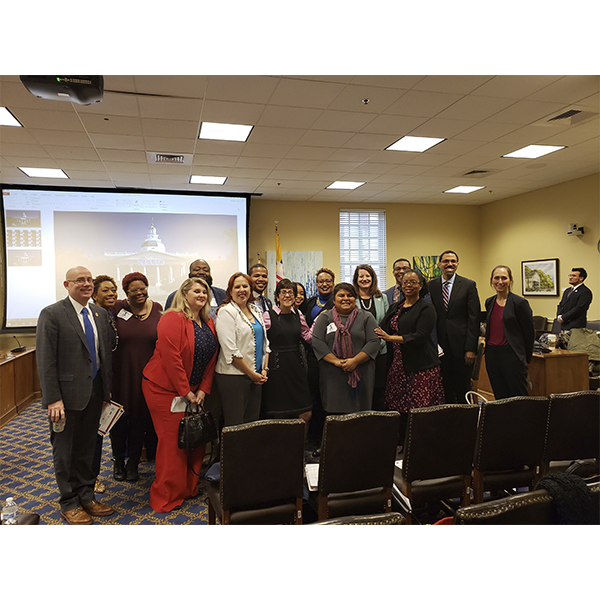
Maryland
How MAREE is Creating Lasting Policy Change in Maryland’s Education System
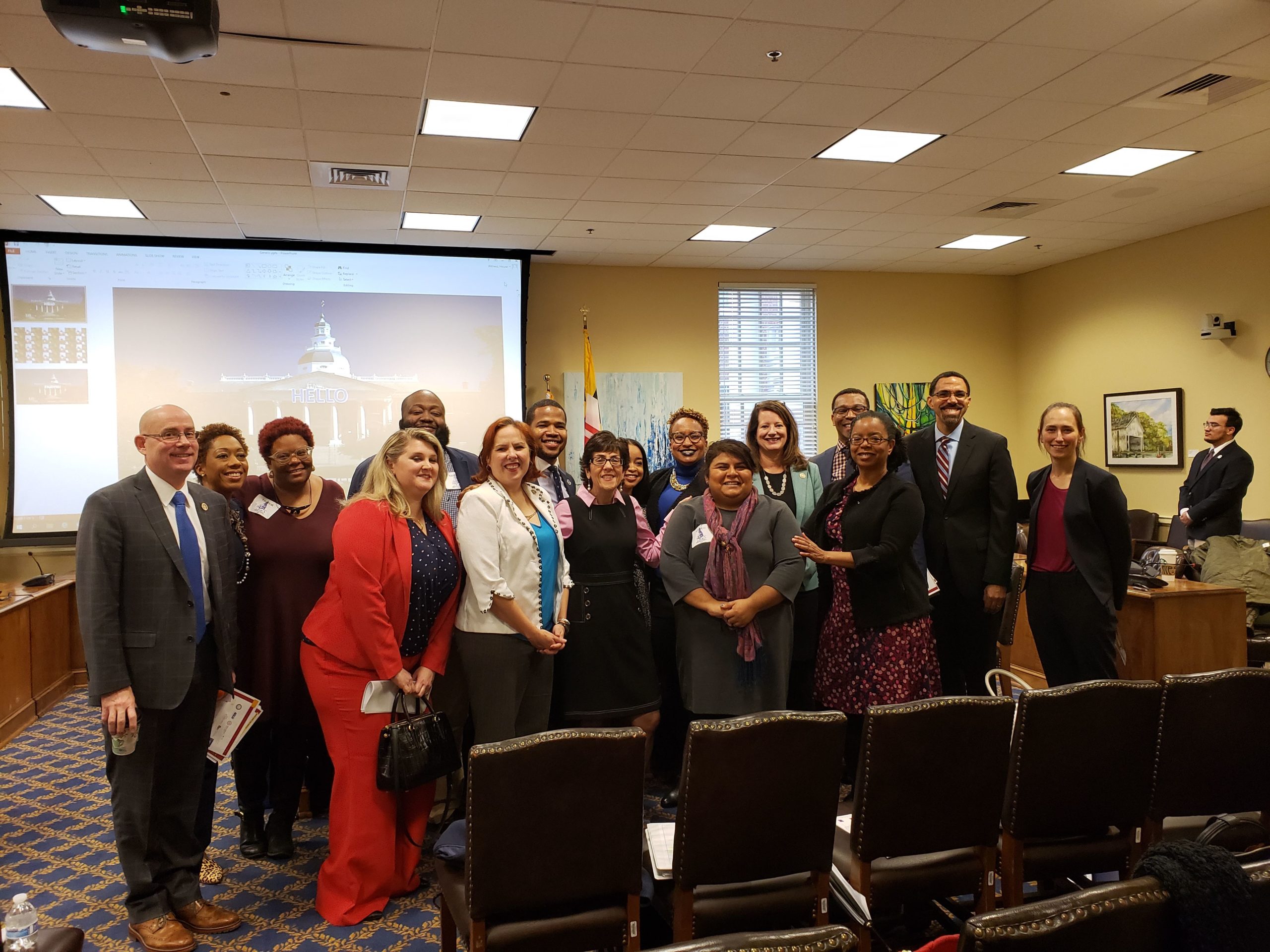
How MAREE is Creating Lasting Policy Change in Maryland’s Education System
MAREE continues to hold the state accountable to ensure Black and Brown students have equitable access to education opportunities.
The majority of Maryland’s students are Black and Latino, and nearly 50% of these students attend schools in one of the three most underfunded districts in the state. Decades of systemic injustice, neglect, and underfunding are leaving far fewer Black and Latino students with the opportunity to succeed compared to their white peers. In fact, majority-Black and Latino districts across the state, including Howard County, Baltimore County, and Prince George’s County, have little to no support from the state on improving school performance or retaining teachers. The state has failed to prioritize increasing the number of Black and Brown teachers and offers little training or support to those currently on staff, resulting in lack of representation in the teaching workforce. As we’ve seen across the country, the COVID-19 pandemic has shoved these disparities into the limelight in a way that is impossible to unsee.
The Maryland Alliance for Racial Equity in Education (MAREE) is fighting to disrupt the cycle of inequity. This coalition of education advocacy, civil rights, and community-based organizations is committed to eliminating racial disparities in Maryland’s education system and includes leading voices such as ACLU Maryland, The Education Trust, and NAACP to name only a few. This close-knit coalition is working everyday to ensure that every Black and Latino child will have access to the bright, liberated, and personally affirming future they deserve.
MAREE’s driving force behind Maryland’s landmark Blueprint Bill. MAREE was instrumental in overriding Governor Hogan’s veto and subsequently passing The Blueprint for Maryland’s Future, a bill intending to “transform Maryland’s early childhood, primary, and secondary education system to the levels of high-performing systems around the world.” Throughout the legislative process, legislators actively sought out MAREE for advice and guidance. MAREE leadership engaged in countless hearings and debates with state lawmakers, offering both written and verbal testimony to ensure the bill adequately supported students who have long been forgotten.
The Blueprint ultimately included 14 of MAREE’s suggested amendments in the final bill. These included accountability for funds, an increase in access to advanced coursework for low income students and students of color, and the provision of additional teachers for “high-need” students. In an effort to close the opportunity gap in largely Black and Latino school districts, the bill designates funds to serve students from low-income families, English language learners, and students with disabilities. The Blueprint prioritizes access to full-day pre-K programs for children from low-income backgrounds and dual language learners. It also increases access to advanced coursework for low-income students and students of color by requiring schools to offer college- and career-ready courses for eligible students.
The Blueprint offered another big win for Maryland students through the implementation of an oversight board to monitor racial and ethnic diversity among educators, hiring practices, and the quality of teacher preparation programs for teachers of color. The Blueprint incentivizes the placement of teachers with highest-need students and provides them with support, including loan repayment, prioritization of career advancement, and increased salary.
Holding Maryland legislators accountable. Although the Blueprint offers substantial gains for Maryland’s low income students and students of color, there is still much work to be done. MAREE continues to research education funding policies, track upcoming bills, and create partnerships with legislators to be strategically positioned for Maryland’s legislative sessions. As the unofficial guardian of equitable education in the state, MAREE is ensuring government leaders stick to their word by putting pressure on lawmakers until change is seen in the public school system. MAREE leaders are well aware that passing equitable policy is just the first of many steps needed to shrink the opportunity gap. This group of education equity and civil rights advocates understands we can’t lose the energy to fight for Black and Brown students because too many racial disparities and barriers to success in Maryland’s education system still exist. MAREE is currently focusing on the following policies: positive school climate and culture, improved data and student outcomes, funding and resource equity, and increased access to opportunities for students of color.
MAREE now aims to influence the education conversation in both the gubernatorial and legislative political races in 2022. They are looking to elevate and influence how education is discussed on the campaign trail, and determine the key issues that should be at the forefront of all candidates’ policy platforms. MAREE plans to begin student and teacher outreach to get key voices directly involved, ensure long term growth, and increase membership and reach across the state. With additional funding, MAREE will amplify their work through increased public communications, community mobilization and outreach, member engagement, and policy strategy.
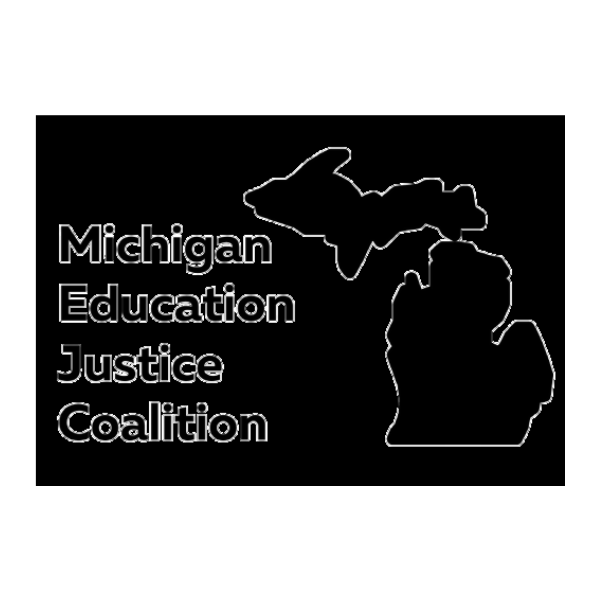
Michigan
Michigan’s Fight to Reverse Decades of Inequitable Education Funding

Michigan’s Fight to Reverse Decades of Inequitable Education Funding
Amid the COVID-19 pandemic, coalitions in Michigan leverage community engagement to bolster support for public education funding.
Michigan is one of the few states where academic achievement is declining, leaving Michigan children to navigate 30 years of accumulated damage. Significant underfunding, decade after decade, has driven away the state’s best teachers, left schools across every corner of the state in disrepair, and nearly bankrupted essential programs like special education. Less than half of Michigan’s third-graders are reading and writing at grade-level. In short, Michigan is failing its students––especially students living on low income, special needs students, English language learners, and students in rural schools.
Prior to COVID-19, Michigan schools were underfunded by $3.7 billion per year, due in part to powerful lobbyists who seek to privatize education at the expense of funding for local public schools. This chronic underfunding creates overwhelming disparities in education opportunities and outcomes between the wealthiest and poorest districts. And yet, local legislators refuse to back policies that create sustainable public education funding. Meanwhile, the Michigan Education Justice Coalition is building influential community syndicates that are demanding quality education for every Michigan student. From Sherman Township to Detroit, these parent- and educator-led organizations understand that equitable schools have the ability to strengthen entire communities and economies.
Why this matters now more than ever. Michigan has arrived at an inflection point. The state can commit to long-term investment in education or allow students to fall further and further behind. COVID-19 has shone a spotlight on the state’s inequity, bringing public education funding to the forefront of Michigan’s public discourse. Parents, students and teachers are more engaged than ever. Once sparsely attended school board meetings are now so full they’ve relocated from offices to auditoriums. The foundation for effective change has been set.
Long-term success and lasting results are dependent on sustained investment in public education. A one-time influx of funds will not solve the problem. Fortunately, the state has an unparalleled opportunity to chart a new path for students of today and generations to come. The American Rescue Plan (ARP) is enabling Michigan to think expansively about a public education system that serves students equitably. Federal relief funds, coupled with revenues from Michigan’s faster-than-expected economic recovery, have resulted in an unexpected state budget surplus that could go a long way toward reducing the education funding gap. At this pivotal moment, it is imperative that we mobilize supporters and allies across that state who recognize the importance of resource equity and are ready to advocate for sustained investment in public education.
Coalitions as changemakers. The Michigan Education Justice Coalition is leading the way toward equity in education funding. The coalition includes members reaching audiences across the state; some, like Mothering Justice, work state-wide and others, such as 482Forward in Detroit, are local within communities. The coalition brings together students, parents, community members and educators committed to providing a quality public education for every child in Michigan. By centering their voices, the coalition is able to ground its work in real-world perspective on the challenges Michigan is facing and the solutions needed to move forward. For example, The Michigan Education Justice Coalition created a community voting tool to hear directly from Michigan communities on where the ARP funds are needed most to meet public concerns and demands. These organizations also put substantial pressure on state and local governments to drive policy change–just this past year, per-pupil spending increased and the state passed a $17-billion School Aid Fund Bill.
How Michigan is fighting back. Education equity coalitions within Michigan are community and education organizing powerhouses. They are building volunteer bases for local school board candidates and identifying academic needs, from new textbooks to healthier cafeteria food to more after school programs. Finding strength in collaboration, coalitions are working together to construct a 10-year policy roadmap that illustrates the necessary steps to achieve education equity in Michigan, including continuous education funding once the ARP federal aid expires in 2024. Coalitions are partnering with Michigan universities to conduct strategic issue research across the state to understand the needs and realities of rural, urban, and suburban areas alike. The findings from this research will guide their strategy for mobilizing parents and students across the state and strengthen their outreach by tailoring conversations to local concerns.
This is just the beginning. Michigan’s recent School Aid Bill is a step in the right direction toward repairing decades of public education neglect in the state. But it isn’t a permanent solution. As 482Forward and the Michigan Education Justice Coalition continue the fight to meet the needs of every Michigan student, they will require even greater community mobilization and long-term engagement.
If you’d like to join Michigan’s fight for education equity, check out Michigan Education Justice Coalition and 482 Forward to learn more about how to donate and become a team leader in your community.

Tennessee
In Tennessee, Unlikely Partners Come Together To Radically Change School Funding

In Tennessee, Unlikely Partners Come Together To Radically Change School Funding
A complex funding formula has inadequately funded schools for too long, creating an unfair playing field for students across the state.
Schools in Tennessee are among the most inadequately funded of any in the country and its antiquated funding formula reinforces inequities between high and low-wealth districts. These inequities create dramatically different educational opportunities for children and contribute to differences in access to key educational resources–expert teachers, personalized attention, high-quality curriculum, and good educational materials–that support learning at home and at school. The way in which state funds are allocated to Tennessee’s public schools is complex, with few parents and community members understanding where the issue lies and how they can advocate for change.
The Tennessee Alliance for Equity in Education is working to change this trajectory, building the capacity of partners and community members to advocate for changes to how schools are funded. The Alliance understands that ambitious modernization of Tennessee’s 30-year old Basic Education Program (BEP) funding formula is long overdue. Federal funds can temporarily supplement state and local dollars, but funding formulas permanently establish how public funds are allocated to each school district. While the formula’s purpose is straightforward, the model is complex and a source of confusion for many––ultimately hurting school districts and children.
This is a pivotal moment. The COVID-19 pandemic highlighted the growing disparities in educational opportunities, exacerbating barriers to quality education for students across the state. State and federal agencies have allocated over $4 billion to be spent by 2025 to support public education in Tennessee––the largest amount of one-time funding the public school system has ever received. The Tennessee Alliance, Education Trust, and other key partners are looking to guide the state through this critical opportunity to properly fund schools in need and close opportunity gaps in a meaningful way. TN25, a survey of parents and advocates across the state, was created in an effort to map the future by crowdsourcing voices across the state. This information will be compiled, and shared with policymakers and education leaders in the state, offering recommendations for accomplishing the ambitious goals needed to create lasting change.
Unifying a diverse set of allies. The Education Trust in Tennessee formed the Tennessee Alliance for Equity in Education at the beginning of 2021, in the midst of the pandemic. What started as simple check-in conversations between partners quickly grew into the Alliance that it is today, where 60+ unlikely partners across the education arena have come together to set an agenda and lay out a roadmap for education opportunity in Tennessee. The set of allies across urban, rural, political, and religious backgrounds work in tandem to bring diverse voices, perspectives, and communities together, and ensure their voices are heard in policymaking. Together, the allies equip an ever-growing and activated audience with knowledge on how schools are funded, and how to achieve adequacy and equity in the state’s funding formula.
Equipping advocates for financial success. With a focus on this immediate opportunity, the Tennessee Alliance recently curated Dollars and Sense, a 7-part learning series featuring expert speakers from Tennessee and across the country. The series was designed to help communities understand the current realities of the BEP formula and the changes necessary to equip students with what they need to thrive.
They also held a 7-month Tennessee School Finance Institute, where leaders from 11 partner organizations were equipped with information and tools, and supported to develop advocacy projects. In one example, a group in Memphis plans to lead a speaker series in order to help women leaders understand education funding and advocate for needed changes. In another, a group of teachers in Nashville who work with English language learners will host an all-day event with educators to discuss ways to increase funding for English learners. The Alliance is well on its way to becoming the repository and state leader on all things education funding in Tennessee. Alliance partners have a shared long-term goal of ensuring that students in Tennessee have access to strong education resources and opportunities, and will work together to make it a reality.
Power through knowledge. With the belief that equipping stakeholders with knowledge leads to power, the Alliance works with a network of partners and students to create change. One program, EmpowerED, is a youth voice network that pushes students to be solutions-oriented partners to advocate for education equity. By harnessing the collective power of student voices, whether through public speaking, student-penned op-eds, or social media strategies, the Alliance provides them with the tools they need to be successful. EmpowerED students are becoming agents of change within their very own schools and communities.
Additional support for the Alliance would allow them to expand their online presence or hire a Resource Equity Fellow to support the government relations team by analyzing the Governor’s budget and legislation that moves through the Tennessee General Assembly. The Alliance is also looking to support the launch of the second Institute cohort, underwrite advocacy training materials for the next legislative session, and provide honorariums to student leaders and school finance experts and presenters.
If you’d like to join Tennessee’s fight for education equity, check out the Tennessee Alliance for Equity in Education to learn more about how to join the alliance, share your personal stories, or get involved in EmpowerED.



